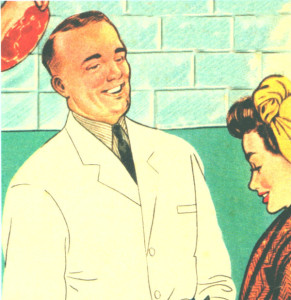 One never sees a butcher’s boy these days. Back in the mid-1960s, I held such a position for Mr Wootton. His was a traditional butcher’s shop with counter and window displays, hanging rails supporting carcases, liberal amounts of sawdust on the floors, chopping blocks and numerous razor-sharp knives. Mr Wootton, resplendent in his white coat, was a kindly sort but was to be avoided when under pressure!
One never sees a butcher’s boy these days. Back in the mid-1960s, I held such a position for Mr Wootton. His was a traditional butcher’s shop with counter and window displays, hanging rails supporting carcases, liberal amounts of sawdust on the floors, chopping blocks and numerous razor-sharp knives. Mr Wootton, resplendent in his white coat, was a kindly sort but was to be avoided when under pressure!
Mrs Wootton also worked in the shop, in the cash kiosk. She was a lovely lady and would deal with all the handling of money. She would also rebuke her husband if he got a bit short with people.
The only other staff member was a lad called Melvyn White, known to everybody as Abler – I have no idea why. He was a r few years older than me and serving an apprenticeship. I knew him vaguely from school and we got on well.
When in the shop between rounds I had to stay in the back room, a preparation area with a cutting table, mincing machine and walk-in fridge and freezer. Abler seemed to spend most of his time in there as well, and we had quite a few laughs together.
Occasionally, if we laughed too loudly, we would earn a shouted reprimand from Mr Wootton out in the shop.
I often had to wait quite a long time between rounds while Mr Wootton prepared the orders in between serving customers. All meat for delivery was placed in plastic bags and the invoice, on a small piece of headed paper, was secured by a small wire sword being stabbed through the bag and into the meat.
bike and completed each of my rounds on foot, carrying the produce in a wickerwork basket. The gradients of my rounds were quite severe, and a wicker basket packed with meat is heavier than you might think. The handle groaned on occasions.
Most of the areas I delivered to around Portland, in Dorset, would have been inaccessible to a vehicle or even a cycle. The Underhill area was a maze of narrow streets and alleyways. Very few houses had numbers; most had names. During the first few weeks I spent a lot of time finding out where I had to make deliveries. A lot of people were out when I called and I had to find the pots, pans and meat safes they had hidden in various discreet locations to leave the orders in. Once I was used to it things went a lot faster, but it took a while. One thing I didn’t have to do was collect money.
On one occasion, I nearly lost a joint. One of my deliveries was to a house sub-divided into flats. It only took a few seconds, so I left the basket at ground level while I popped upstairs to make the delivery. On my return I was horrified to see a small terrier trying to back his way through the privet hedge, but being prevented from doing so by the leg of lamb held tightly in its jaws! A fearsome tug of war then ensued, with the dog and I either side of the hedge and the leg of lamb somewhere in the middle.
Fortunately, I won the day. A bit of brisk rubbing removed the battle scars from the lamb and I delivered it a little later. As nothing was ever said, I can only presume that nothing untoward was noticed.
The Saturday before Christmas was always an exceptional day and I could expect to work much longer. The amount of meat some people ordered was unbelievable and I would have to load up my basket and deliver many more times than usual. This, coupled with the fact that Mr Wootton was even busier in the shop, didn’t make for a calming run up to Christmas! The shop would be packed to the rafters with stock, especially turkeys and chickens.
What surprised me on my first Christmas there was that the butcher’s boy got tips – and generous tips at that. The customers I saw quite often gave me half a crown or two shillings. The ones I didn’t see left little envelopes (‘For Roger, Merry Christmas’) in their hiding places. Nearly everybody gave me something. On my first Christmas I had nearly £5 in tips – I was astounded. My wage was just seven shillings a week!
It was hard physical work, in all weathers, for little financial reward, but that is the way it was and I never complained. In fact, I looked forward to my Saturday mornings. They were fun times.
Roger Mutch, Weymouth, Dorset








